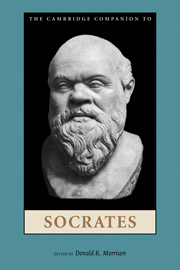Book contents
- Frontmatter
- 1 The Rise and Fall of the Socratic Problem
- 2 The Students of Socrates
- 3 Xenophon and the Enviable Life of Socrates
- 4 Socrates in Aristophanes’ Clouds
- 5 Socrates and the New Learning
- 6 Socratic Religion
- 7 Socrates and Democratic Athens
- 8 Socratic Method
- 9 Self-Examination
- 10 Socratic Ignorance
- 11 Reconsidering Socratic Irony
- 12 Socratic Ethics and the Socratic Psychology of Action
- 13 Socrates and Eudaimonia
- 14 Socrates’ Political Philosophy
- 15 Socrates in Later Greek Philosophy
- Socrates Bibliography
- Index of Names and Subjects
- Index of Passages
9 - Self-Examination
Published online by Cambridge University Press: 28 March 2011
- Frontmatter
- 1 The Rise and Fall of the Socratic Problem
- 2 The Students of Socrates
- 3 Xenophon and the Enviable Life of Socrates
- 4 Socrates in Aristophanes’ Clouds
- 5 Socrates and the New Learning
- 6 Socratic Religion
- 7 Socrates and Democratic Athens
- 8 Socratic Method
- 9 Self-Examination
- 10 Socratic Ignorance
- 11 Reconsidering Socratic Irony
- 12 Socratic Ethics and the Socratic Psychology of Action
- 13 Socrates and Eudaimonia
- 14 Socrates’ Political Philosophy
- 15 Socrates in Later Greek Philosophy
- Socrates Bibliography
- Index of Names and Subjects
- Index of Passages
Summary
There are two texts that may be considered as fundamental for the understanding of the Socratic notion of self-examination: one from the Apology, one from the Phaedrus. (In this chapter, I shall restrict myself to discussion of the notion as it appears in Plato, without claiming that Plato gives us the authentic, (i.e., historical) Socratic version – although I know of no evidence that would seriously interfere with such a claim.)
1. Apology 37E3–38A6: Perhaps someone might say “But Socrates – why shouldn’t you be able to leave Athens and keep your mouth shut, living a quiet life?” This is what it’s most difficult of all to persuade some of you about. If I say that living a quiet life is disobedience to the god, and that therefore it’s impossible to do it, you won’t believe me because you’ll think I’m being ironical. If on the other hand I say that it really is a good of the highest order for a human being to spend each day in discussions about virtue [or ‘excellence’, ‘goodness’: aretê] and the other things you hear me conversing about , and examining myself and others, and that the unexamined life is unliveable for a human being – if I say that, you’ll believe me even less.
2. …
- Type
- Chapter
- Information
- The Cambridge Companion to Socrates , pp. 201 - 214Publisher: Cambridge University PressPrint publication year: 2010
- 7
- Cited by

